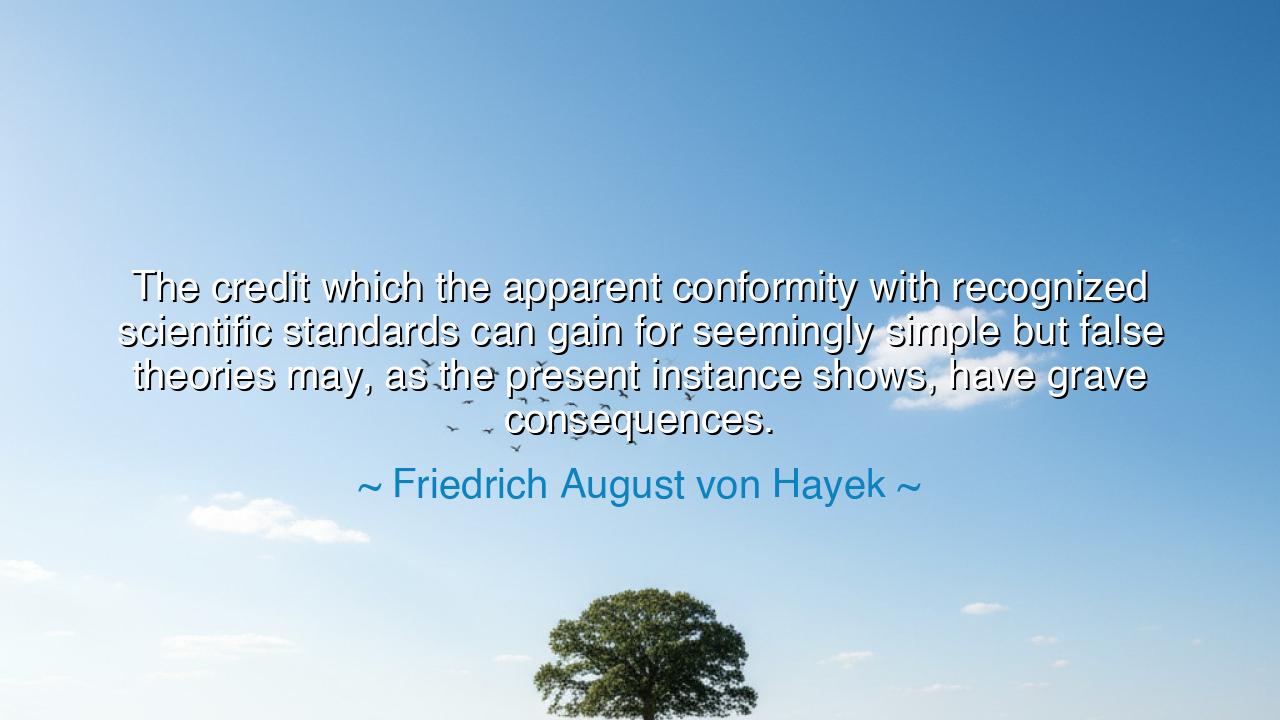
The credit which the apparent conformity with recognized
The credit which the apparent conformity with recognized scientific standards can gain for seemingly simple but false theories may, as the present instance shows, have grave consequences.






“The credit which the apparent conformity with recognized scientific standards can gain for seemingly simple but false theories may, as the present instance shows, have grave consequences.” Thus warned Friedrich August von Hayek, a sharp thinker who saw both the strength and the danger of human reason. In these words he speaks of a subtle peril: that a theory, though cloaked in the garments of science, may be false, and yet gain power because it appears to follow the rules of scientific standards. Such deception is not harmless—it may shape policies, enslave peoples, and bring suffering to millions.
The origin of this warning lies in the great ideological storms of the twentieth century. Hayek lived through an age when both fascism and communism claimed the blessing of science. Each system boasted of its conformity to rational planning, of its reliance on economic or biological “laws.” Yet what they called science was often illusion—simplified theories, pleasing to the ear, but false at the core. And because they wore the mask of scientific authority, they gained legitimacy and led whole nations astray. Thus Hayek declared that the false, when dressed as the true, is most dangerous.
History bears witness. In the Soviet Union, Marxist theory claimed to rest upon the “scientific laws of history.” It promised a simple path: abolish property, centralize control, and utopia would follow. This seemed to conform to rational order, to the very image of science applied to society. Yet the theory was flawed, and its results were famine, oppression, and fear. Millions perished, not because of ignorance, but because falsehood had been enthroned under the banner of science. This is the very tragedy Hayek describes: the grave consequences of false theories made powerful by their outward conformity to scientific forms.
The same pattern can be seen in the so-called “scientific racism” of the nineteenth and twentieth centuries. Men cloaked prejudice in the language of measurement and biology, producing charts, formulas, and statistics that gave an appearance of rigor. Many believed them, for they looked like science. But the theories were false, and their fruits were segregation, sterilization, and genocide. Here again, we see the peril of seemingly simple but false theories granted authority by their appearance of scientific legitimacy.
Yet Hayek’s words are not only a warning from the past—they are counsel for all ages. For the temptation of simple explanations is eternal. People long for theories that are easy to grasp, that promise quick answers to deep problems. And when such theories dress themselves in the language of science, they gain respect and spread swiftly. But truth is rarely so simple. Genuine science is slow, complex, and humble before uncertainty. The false is often swift, clear, and arrogant. It is for this reason that the wise must remain ever watchful.
The ancients, too, knew this truth. Plato warned against sophists, whose clever arguments could dazzle but conceal falsehood. Confucius cautioned that fine words and an appearance of wisdom often hide the lack of virtue. Hayek stands in this lineage: reminding us that appearances deceive, and that even the form of science may be used to cloak error. What matters is not the conformity to outer standards alone, but the relentless testing of truth against reality.
So, O listener, take this lesson into your heart: do not be deceived by the elegance of a theory, nor by its conformity to recognized standards, unless it proves itself true in the furnace of evidence and experience. In your studies, in your work, in your civic life, test what you hear. Ask always: is this true, or merely dressed to appear true? Be wary of the simple answers to complex questions, and remember that the false, once enthroned, can have grave consequences for generations. For as Hayek teaches, only truth, patiently sought and humbly guarded, can guide humanity safely through the storms of error.






AAdministratorAdministrator
Welcome, honored guests. Please leave a comment, we will respond soon